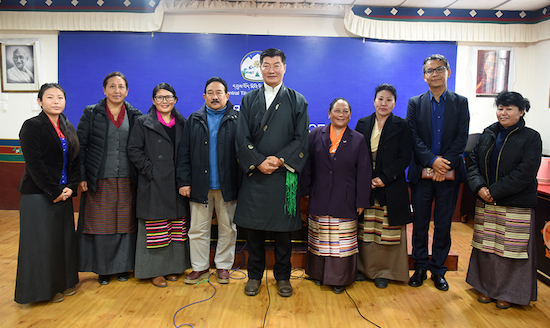DHARAMSHALA: Tibetan political leader Sikyong Dr Lobsang Sangay today rolled out the 15th Kashag’s revised women empowerment policy at a press conference held at DIIR’s Lhakpa Tsering Memorial Hall. The existing women empowerment policy was introduced by the 13th Kashag under Professor Samdhong Rinpoche in October 2008.
“It has been almost ten years since the women empowerment policy was introduced by the previous Kashag. Sine then, there has been a lot of discourse in the national and international forums including within our community about the need to relook and revise the policy,” Sikyong said.
“The previous Kashag’s policy has been extremely helpful in providing facilities and creating an environment where women could take part equally in the Tibetan freedom struggle,” he noted.
However, he added that even though Tibetan women and girls have made rapid strides in contemporary Tibetan society including in the fields of education, health, and economy based on the previous policy, there are still areas for further improvement.
“Given the fact that a lot of discourse is going on within the community, the 15th Kashag recognised the need to revise the existing Tibetan Women’s Empowerment Policy to better enable Tibetan women to fully participate and contribute to the Tibetan society and the world,” he explained.
Sikyong further highlighted His Holiness the Dalai Lama’s emphasis on the empowerment of women, and quoted an often-repeated remark made by His Holiness that ‘women make better leaders as they are inherently kind, compassionate and equipped with qualities to nurture and care.’
Sikyong also lauded Tibetan women’s crucial role in safeguarding Tibet’s unique and rich religious, linguistic and cultural traditions beginning from the non-violent Tibetan women’s uprising against the repressive policies of the Chinese government on 12 March 1959.
The revised seven-point women empowerment policy was drafted by a committee composed almost entirely of senior women officials of the CTA. The policy was adopted by the Kashag following due consultations and comprehensive deliberations with women from all walks of life including ground level women leaders, students, teachers, nuns, homemakers, etc.
The revised women empowerment policy outlines seven key points in its stated objective of making Tibetan women equal partners in all aspects of Tibetan society. The points include Women and human rights, Education, Health, Economy, Governance and Leadership, Social, and Sexual and Gender-based Violence (SGBV).
On Sexual and Gender-based Violence, the Kashag has promised to adopt a zero tolerance policy. It further promised to sensitise community members on SGBV and establish a redressal mechanism for those who have experienced gender based harassment and discrimination.
As part of its commitment on women empowerment, the Central Tibetan Administration is also organising the ‘First Women’s Empowerment Conference’ from 21 – 23 February at Dharamshala. The conference is expected to bring together around 250 participants (both women and men) from across the spectrum to discuss on four broad topics: governance and leadership, mainstreaming gender perspective into the development process, social empowerment, and sexual and gender-based violence.
Whilst participation in the conference is on invitation basis, seats are also reserved for open registration under the following categories. Click here to register online.
Categories: Total 90 seats
- Overseas Tibetans 10 seats (female and male)
- College-going youth and Nursing students from North India – 32 seats (26- female, 6-male)
- College-going youth and Nursing students from South India – 18 seats (14- female, 4-male)
- General participants from India, Nepal and Bhutan-20 seats (10-female and 10-male)
- Civil Society Organizations- 10 seats (female only)
The Department of Home will bear all costs related to travel, food and accommodation within India, Nepal and Bhutan.
Guidelines for TA and DA reimbursement are as follows:
All your travel fares will be reimbursed under the following conditions:
- Travel fare for AC3-tier train and bus will be reimbursed upon submission of an original ticket.
- No flight cost will be accepted
- Daily Allowance of INR 250 per day will be provided during the journey
- Room rent allowance for shared room should not exceed INR 800. You will need to submit the original bill to claim your reimbursement
- You will be given a maximum amount of INR 500 to pay for your local and ground transport but need to submit the original bills
- Reimbursement for your return journey will be based on the costs incurred for your first journey
- Only in country TA and DA reimbursement will be provided to the participants from overseas.
Logistical arrangements in Dharamsala:
- Room rent allowance of up to INR 1000 for shared room will be provided. You will have to arrange for your own accommodation in Dharamsala during the course of the conference for four nights—February 20, 21, 22 and 23 and check out on February 24 before noon
- During the conference you will be given INR 250 per day (although lunch and refreshments will be served at the conference venue)
- You will be given refund for shared local travel to and fro the conference venue once receive the bill


